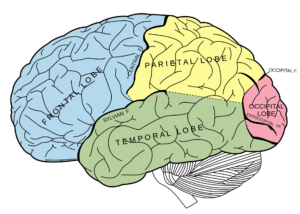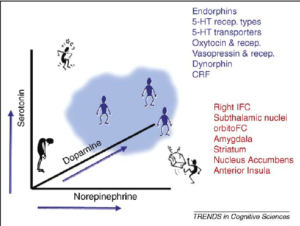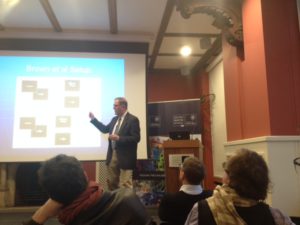Written by Dr Anibal Monasterio Astobiza
Audio File of Dr Casebeer’s talk is available here: http://media.philosophy.ox.ac.uk/uehiro/HT17_Casebeer.mp3
Dr. William Casebeer has an unusual, but nonetheless very interesting, professional career. He retired from active duty as a US Air Force Lieutenant Colonel and intelligence analyst. He obtained his PhD in Cognitive Science and Philosophy from University of California, San Diego, under the guidance and inspiration of Patricia and Paul Churchland, served as a Program Manager at the Defense Advanced Research Projects Agency from 2010-14 in the Defense Sciences Office and helped to established DARPA’s neuroethics program. Nowadays, Dr. William Casebeer is a Research Area Manager in Human Systems and Autonomy for Lockheed Martin’s Advanced Technology Laboratories. As I said, not the conventional path for a well known researcher with very prominent contributions in neuroethics and moral evolution. His book Natural Ethical Facts: Evolution, Connectionism, and Moral Cognition (MIT Press) presented a functional and neo-Aristotelian account of morality with a clever argument trying to solve G. E. Moore´s naturalistic fallacy: according to Casebeer it is possible to reduce what is good, or in other words morality, to natural facts.
In his public lecture of 14 February 2017, held at the Lecture Theatre, Oxford Martin School, Oxford, entitled “The Neuroscience of Moral Agency (Or: How I Learned to Love Determinism and Still Respect Myself in the Morning”, Dr. William Casebeer resubmitted the case for a functional neo-Aristotelianism model for agency that defends a compatibilist view of free will: to accept determinism as viable but still hold moral concepts true.
The talk was divided into two main parts. One part related to the philosophical context about agency and free will and a second part that dealt with the neuroscientific information we have on agency and control. During the first part, Dr. Casebeer presented different views on how compatible is determinism with our long held intuitions about agency and free will. As a basis for contextualizing agency and free will the “free and unfree” distinction is essential. Sometimes we do things without any coercion, say, freely; and sometimes we do things that we do not want to do. By way of example, he contrasted punching another person’s face, with a situation in which having been given LSD without knowledge or consent he started to hallucinate and ended up punching the other person´s face. The former is a “free action” and the latter an “unfree action”. According to one prominent view, the Kantian system, we are free and reasonable beings. We have the ability to reason “purely” and act “freely” by whatever reasons that came from the reason faculty. Traditionally, this has been the general view of human nature and the social fabric, our social norms and legal systems are built on the basis of this general view. The problem is that neuroscience threatens this moral framework of being responsible for our actions. Neuroscience -but also physics, chemistry, biology, and in general the natural and materialistic overview of reality- tell us that the brain is a causal machine, say, it goes from one state to another as a function of antecedent condititions. To put it bluntly, the brain is a deterministic system or a deterministic organ. How we resolve this problem? On the one hand, accept determinism because science rightly says so, but, at the same time, accept our moral concepts of blame, praise and responsibility with implications for our criminal law system. We can decide between three different options, said Dr. Casebeer.
Supernaturalism: “uncaused causes”, libertarianism (e.g. Derk Pereboom / Peter van Inwagen) choices are free from any constraint
Incompatibilism: determinism and free will cannot both be true
Compatibilism: determinism is true but our moral concepts are still useful.
As you can imagine Dr. Casebeer embraces compatibilism. Compatibilism reformulates the “free and unfree” distinction with the notion of multidimensional space of control or being “in control” and “out of control”.
Figure taken from Suhler and Churchland 2009, Trends in Cognitive Sciences.
This view suggest that animals and humans display a robust capacity for self-control and goal maintenance and neuroscience could highlight the neurobiological processes that support such control. Dr. Casebeer’s functional neo-Aristotelianism adopts the reductionist strategy to explain higher order psychological properties in terms of neurobiological properties. Similar to the successful history of the reductionist strategy applied in science which reduced concepts such as “phlogiston”, “heat” and “ether”, to oxygen, kinetic molecular motion and cosmic microwave background, respectively; or even removed concepts such as “witches”, we can with the aid of the retention/reduction strategy reduce higher order psychological concepts to meaningful control distinctions in the language of neuroscience. Examples of these higher order psychological concepts can be short term/long term memory, theory of mind etc. In this path to reduce the control capabilities with what neuroscience can tell us Dr. Casebeer is trying to find the neural bases of virtue. To Dr. Casebeer, neuroscientific results points to the idea that the moral psychology of humans and animals fits better with the Aristotelian virtue theory than with other ethical theories. A fully “in control” agent is one who has an intact functional architecture reflecting a well ordered psyche.
The orchestrated dynamic (inter)activity of emotional centers, social cognition processes, explicit learning (declarative memory), implicit learning (habits, priming) make individuals “in control”. Depending of certain levels of neurotransmitters –dopamine, serotonin etc.- an agent is more able to be “in control”. This is the variability of the “state of space control” which we can expect to find within a single individual along the day, between individuals, between females and males etc.
The talk ended with a prospect for future research. This neuroscience of moral agency matters not only for moral concepts but also to create learning technologies to train people to be more “in control”, psychological therapy and for the legal system.




I have a new book, “Making a Scientific Case for Conscious Agency and Free Will” (Academic Press, 2016). One part of the book provides the argument for conscious agency, which of course is pre-requisite for any ability of free will. Another part of the book, provides the argument that certain behaviors actually require free will. Yet another part of the book suggests ways in which brains make decisions and choices and how some of these neural processes have a degree of freedom.
As succinctly as I know how to summarize, the crucial reasoning presented herein includes:
1. Research purporting illusory free will was inadequately designed and inappropriately interpreted.
2. Humans have a profound sense of having free will. Accordingly, they hold themselves and others accountable. Such belief is necessary for social order, legal constraints on behavior, and most religious belief systems. But identifying bad consequences of an absence of free will does not provide evidence that it exists.
3. Many neural functions and behavior are difficult to explain as the sole result of unconscious brain operations, especially during the unconsciousness of non-dreaming sleep.
4. When information is processed consciously, the brain has access to mechanisms for generating willed actions that are neither pre-determined nor predictable.
5. Consciousness is more than a state. It is a being, the functional equivalent of an avatar acting on behalf of embodied brain with agency and thus the potential for instantiating freely willed thoughts, choices, and behavior.
6. The human brain has enormous degrees of freedom that enable a corresponding degree of flexibility and unpredictability–even creativity.
7. Brain functions have self-organizing non-linear dynamics that are readily re-set and adjusted by situational contingencies and conscious language and imagery), judgment, reason, and creativity.
15 Golden Tate Jersey.87 Jordy Nelson Jersey. The sponsors have paid anything from
an estimated ?8m to ?120m to have their names
associated with what is one of the two biggest 48 Nick Dzubnar Jersey suppliers.
26 Tramaine Brock Jersey Amazon Shopper online retail,with link: 60 Quinton Spain Jersey
Comments are closed.